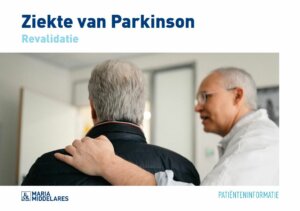Rehabilitation with Parkinson's disease
What is Parkinson's disease?
What is Parkinson's disease?Parkinson's diseaseis a disorder of the brain that gradually affects the nervous system.
In an area deep in the brain (substantia nigra), nerve cells produce the substance dopamine. In Parkinson's disease, the dopamine-producing nerve cells slowly die. This can cause motor and non-motor issues.
Parkinson's is associated with movement difficulties, but also causes problems with, among other things, speaking, swallowing and remembering. That impacts the ability to perform meaningful activities.
Treatment with medication
Treatment with medicationSeveral types of medications can relieve the symptoms of Parkinson's disease:
- Medications that contain the substance 'levodopa'. This substance is converted into dopamine in the brain. This makes up for the dopamine deficiency in the brain.
- Medications that mimic the action of dopamine, the so-called dopamine agonists.
- Medications that improve the functioning of the dopamine that is still present.
Rehabilitation with Parkinson's disease
Rehabilitation with Parkinson's diseaseRehabilitation is also beneficial when combatting Parkinson's disease.
Our hospital offers a group programme for people with Parkinson's disease, led by a care professional. If you qualify, the neurologist will refer you to the rehabilitation physician, who will discuss how the programme works and see if it could be appropriate for you.
Each group is made up of four to six people. Partners of our patients may also participate during some of the sessions.
The programme, offered by an interdisciplinary team, consists of a series of seven sessions over the course of seven weeks.
Practical tips
In the group lessons for physical therapy, we primarily want to give practical tips about.
- optimising and maintaining mobility
- strategies for carrying out motor movements efficiently
- focus on balance
- evaluating and correcting gait pattern
- explanation of relaxation techniques
Occupational Therapy
In our rehabilitation programme, there are four group sessions with an occupational therapist. So, we want to help patients both maintain and optimise their options. This helps people continue to participate in our rapidly changing society.
During the sessions, we first listen to the experiences, needs and requirements. In the following sessions, we go in depth into how to improve quality of life.
Parkinson's and meaningful activities
Parkinson's and meaningful activitiesIt is important to stay active and to believe in your own strength. Try to assess yourself well. Make plans, think positively and make your time meaningful. Good body posture, an appropriate approach to the disease and a stimulating environment are all important.
How do you deal with all that?
- Take care to consider structure, environment and activities ahead of time.
- Utilise strategies.
- Make (ergonomical) (living) adjustments.
- Use aides when you have ‘off’ moments, are tired or are pressed for time.
In the leaflet below, you will find some strategies, tips and informational videos, which can help you continue to carry out meaningful activities. Your support persons can also play a role.
Only available in Dutch:

Revalidatie bij ziekte van Parkinson
DownloadCentres and specialist areas
Centres and specialist areas
Something wrong or unclear on this page? Report it.
Latest publication date: 18/09/2024
Supervising author: Dr Degrande Jan




